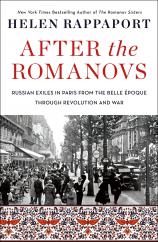After the Romanovs: Russian Exiles in Paris from the Belle Époque Through Revolution and War
Review
After the Romanovs: Russian Exiles in Paris from the Belle Époque Through Revolution and War
They came to Paris to be seen. They came for the haute couture, the food and the arts. Grand dukes, princesses, generals and every imaginable luminary of Imperial Russia made Paris part of their lives during the Belle Époque. They lived on massive estates and in sumptuous Parisian apartments. They held salons and great feasts. They squandered enormous sums on their hedonistic adventures with a blind eye to the future. As they hurtled towards the Great War, a visiting Russian diplomat mused, “Hurry up. Hurry up, and enjoy yourselves; these are the last months of your thoughtless, brilliant, and luxurious existence.” Money meant nothing to them because they had so much of it.
They came to Paris to write. They came to paint and dance, and to redefine what art meant. Penniless, they huddled in dank cafes for the heat of their fires and lived in cramped ghettos. They shared everything in order to survive. Some of the most renowned artists were still unknown and struggling to succeed. Money meant nothing to them because they had none.
"The waves of Russian exiles, their differing backgrounds, and their varied successes and failures were fascinating. Their reactions to events like recognizing the USSR, the World War II alliance and Hitler will stun."
AFTER THE ROMANOVS is an ambitious and dense look at the Russian émigrés (and their communities) in Paris during the Belle Époque, the Russian Revolution and the World War I. As one would imagine, each of these events produced a different émigré. The grand dukes and duchesses holding salons in the 1890s bore little resemblance to the refugees of the revolution. The communities that grew up around each group shared nothing in common beyond their being Russian. In fact, the one constant was that each of them mistrusted --- even hated --- the others.
What these disparate groups had in common, and what this book captures so well, is the hold that Russia had on them. Whether it was a Romanov grand duke, a Bolshevik poet or a White Army officer, they all longed to return to Mother Russia. For the royals, that day would never come. For many of the artists and writers, they spent their most productive years estranged from their source of inspiration --- Russia. As writer Ivan Bunin noted after almost 20 years in Paris, “Russia is in my soul…. This has not disappeared with the years.” While some merely expired in France, and others went on to the US or elsewhere, many would eventually return to the new Soviet Union with mixed results.
The depth of the research is impressive, and the scope of the book is ambitious. Helen Rappaport successfully traces those first Belle Époque artists and royals, those who were forced to flee with nothing during the revolution, and their experiences through World War I and beyond. Their stories are compelling and will engender conflicting feelings for the reader. Rappaport makes a great observation that the average Russian émigré is not chronicled because there was no one to document their stories. While it is tragic for a grand duke to be reduced to driving a taxi, we are challenged to define our own feelings. In the end, I felt no great sympathy for many of the royal émigrés as their struggles entailed selling crown jewels below market value.
AFTER THE ROMANOVS traces the many personalities that made up this diaspora. It is dense reading that will certainly appeal to some, but it is not for the recreational reader. Keeping track of all the characters (70 to be exact) is difficult. Without a storyline, the writing is haphazard, almost random, jumping from topic to topic and person to person. The story would lose nothing in content, and gain much in pleasure, if a few starving poets were trimmed. Also, the Romanov aspect of the book is at best a mere fraction.
I liked the book for its place in history. The waves of Russian exiles, their differing backgrounds, and their varied successes and failures were fascinating. Their reactions to events like recognizing the USSR, the World War II alliance and Hitler will stun. The Romanov world, opened up well beyond Nicholas and Alexandra, was compelling, as were the wild hedonists and determined realists. Perhaps one of my favorite stories here concerned Nicholas’ mother. The dowager empress withheld endorsement of a new claimant to the throne, not by intrigue or for gain, but because she clung to a mother’s hope that Nicholas and her other son, Mikhail, were still alive.
If this kind of history appeals to you, then I heartily recommend AFTER THE ROMANOVS. The footnotes will lure you into the research and take longer to get through than the book itself, but they are worth it.
Reviewed by John Vena on March 18, 2022
After the Romanovs: Russian Exiles in Paris from the Belle Époque Through Revolution and War
- Publication Date: March 28, 2023
- Genres: History, Nonfiction
- Paperback: 352 pages
- Publisher: St. Martin's Griffin
- ISBN-10: 1250777208
- ISBN-13: 9781250777201




